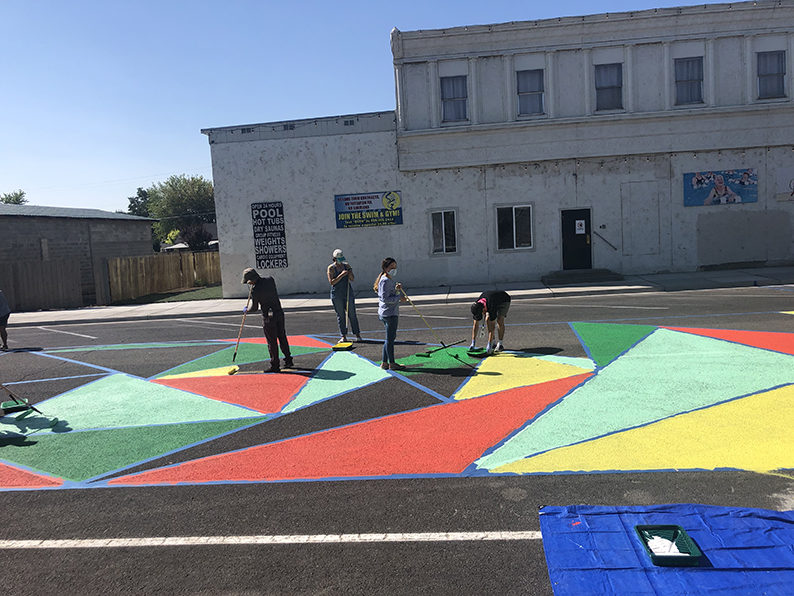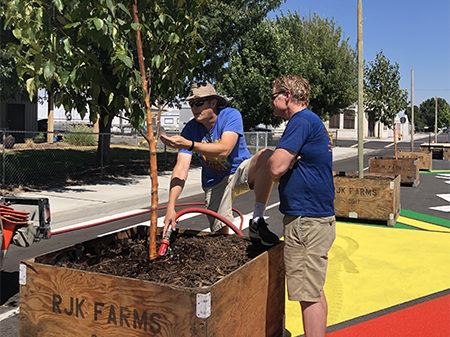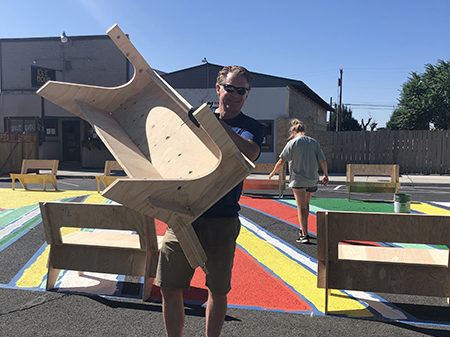Creating multi-use community gathering spaces in Quincy, Washington

Quincy, in central Washington, is home to several large datacenters and has a history as an agricultural center where potatoes, wheat, and apples are grown. Tourists visit Quincy for its proximity to the Gorge Amphitheatre, wineries, and recreation opportunities. Residents and tourists alike desire safe, beautiful places to shop, stroll, and gather.
Building vibrant pop-up experiences with local ownership
The Better Block Foundation was started about ten years ago with work in a Dallas neighborhood that had low perceived safety. The group brought neighbors together to paint bike lanes, set up café seating, and create pop-up businesses in a safe shared space. “A lot of our work is focused on rapid revitalization of places that people don’t think of as people spaces, and in bringing a community together,” says Jason Roberts , Better Block Founding Director. “Many areas are prioritized for cars. We found we can take some of those spaces and allow for more pedestrian activities and bicycling.” This work has now been emulated in communities around the world, from Melbourne, Australia to Tehran, Iran.
Microsoft and Better Block together connected with stakeholders in the city of Quincy, including folks from the Chamber of Commerce, to discuss plans to create an outdoor community space in the summer of 2021. Local high school students stepped in to fabricate items for the project, and volunteers assembled pieces and helped bring the space to life. Over 2,000 attendees then arrived to enjoy the area on July 16 and 17, 2021. The space featured a variety of furniture, a stage, and planter boxes, and hosted live music and a farmers’ market. “It was awesome. Better than we expected,” said Catalina Blancas, Quincy Valley Chamber of Commerce executive assistant.



Providing open-source media to enable rapid prototyping
Better Block has developed and offers a library of free designs for furniture, signage, games, and other items that can be used in these spaces. These designs can be downloaded and used by digital fabrication devices that work in a subtractive process to cut out the required pieces, which fit together like a 3-D puzzle without the need for hardware, nails, or glue. The items completely disassemble and fit neatly into a shipping container when not in use. This pop-up style allows for easier permitting, letting cities test out what works before embarking on the lengthier planning process required for permanent spaces.
In Quincy, the local high school was engaged so that students could learn how to use these fabrication tools while working on real-world projects. “The exciting part is that the high school has probably some of the most advanced tools that we’ve come across. We’ve talked to them, and they’re excited for us to come in and help them learn to use these tools. A lot of schools may have these tools, but they aren’t utilizing them to their fullest potential,” says Roberts. The participating students will be able to see their impact on community projects in their own town.
“A lot of our work is focused on rapid revitalization of places that people don’t think of as people spaces, and in bringing a community together.”
—Jason Roberts, Founding Director, Better Block

